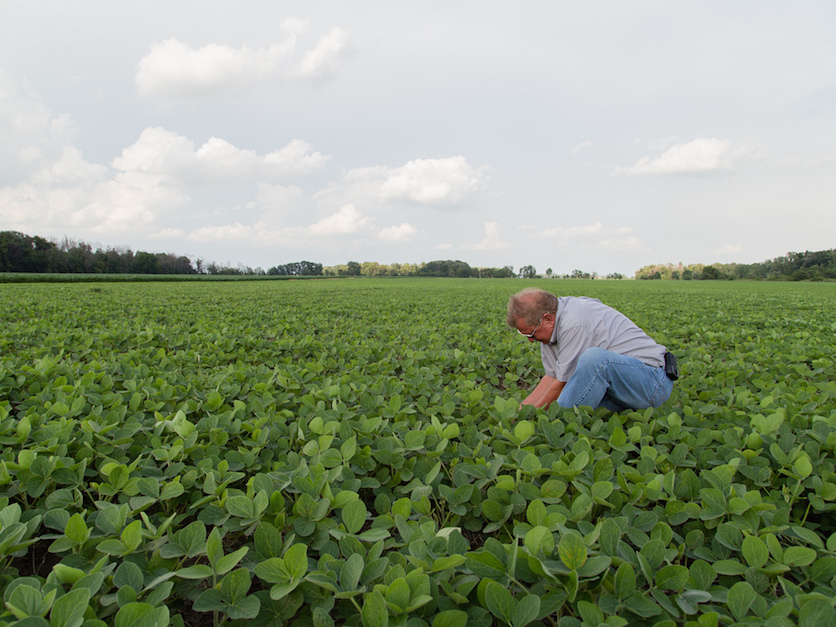The USDA appears to be on track to unveil on Friday details of a $12 billion assistance plan for farmers hurt by the international blowback from President Donald Trump’s trade battles with China, Mexico, the European Union, Turkey and elsewhere.
The USDA is keeping implementation details for the program close to the vest, but Agri-Pulse has learned that the payment rate for soybean farmers has been preliminarily proposed at $1.65 per bushel and 1 cent per bushel for corn farmers, according to officials close to the decision-making process. Those officials stressed that those numbers could change under the White House Office of Management and Budget, where the package is currently being reviewed, so they may not reflect the final proposal. USDA would not confirm or deny these proposed payment rates.
Those payments, which USDA has said will be based on production multiplied by a payment rate, will be part of the Market Facilitation Program portion of the program. The agency also pledged to make payments to producers of sorghum, wheat, cotton, dairy and hogs.
The assistance plan will be split into three parts, one of which is a Food Purchase and Distribution Program that allows the USDA to purchase surplus commodities that would have been exported if not for tariffs. The third part is a Trade Promotion Program, in which USDA officials say the department will lean on the private sector to help develop new foreign markets to replace the ones the U.S. is losing in its trade wars.
The $1.65 for soybeans that USDA has preliminarily proposed to OMB is in line with farmers' expectations, said Grant Kimberley, director of market development for the Iowa Soybean Association.
“I’ve heard it will be $1.50 to $1.90 per bushel,” Kimberley told Agri-Pulse. “That’s been about what the impact of prices have been since the trade war went into effect. It would make sense that it would be in that range. The impact on prices has been about a 20 percent hit since the tariff went into effect.”
A USDA spokesperson said: "USDA will not confirm what Agri-Pulse is reporting, because it is based on preliminary information, is incomplete, and lacks context. The final rule is still undergoing the rule-making process, and so any information reported at this stage may turn out to be inaccurate. Further, it may do a disservice to stakeholders to supply them with information that is not in its final form."
Interested in more news about the farm bill, trade issues, pesticide regulations and more hot topics?
Sign up here for a four-week Agri-Pulse free trial. No risk and no obligation to pay.
China is the largest foreign market for U.S. soybeans, but U.S. shipments have been severely curtailed since June when China hit the trade with a 25 percent import tax. The Chinese tariff was retaliation to the Trump administration’s decision to slap tariffs on $34 billion worth of Chinese goods to persuade China to stop stealing U.S. intellectual property.
The Chinese tariffs will sharply reduce U.S. exports this year and the resulting price declines are hurting farmers, said Kimberley. The trade assistance package won’t nullify that pain, but it will help put much-needed funds in farmers' pockets after the harvest so they’ll be able to renew lines of credit.
When asked about the $1.65 per bushel rate for soybeans, John Heisdorffer, president of the American Soybean Association, replied: “This would be a good number for growers.”
A farmer with 1,000 acres and a USDA average yield of 51.6 bushels per acre could expect to collect about $85,140. Substantially larger growers could be impacted by payment limitations, which are also expected to be part of the proposed rule and will limit overall payments.
But corn farmers are expected to be disappointed, say industry representatives who asked not to be named.
“That’ll go over like a lead balloon,” said one official, who admitted that even though corn exports were not impacted nearly to the extent of soybeans, farmers are still hoping for substantive help.
Corn farmers did not make a pitch to USDA officials for a specific level of help under the trade assistance package, another industry source said, but they did make a concerted plea that the department not base the aid on production, but rather planted acres because drought hurt many producers.
U.S. rice farmers are counting on the Food Purchase and Distribution Program in the new package to help out, says the USA Rice Federation.
“During several meetings with senior USDA officials, USA Rice discussed domestic rice varieties that are affected by trade tariffs and how the USDA could include more U.S.-grown rice in their food purchasing program,” the group said recently. “USDA plans to purchase multiple varieties of U.S.-grown rice in an assortment of packaging styles and sizes for distribution in schools, food banks, senior citizen communities, Indian tribal organizations, and disaster areas.”
For more news, go to: www.Agri-Pulse.com



